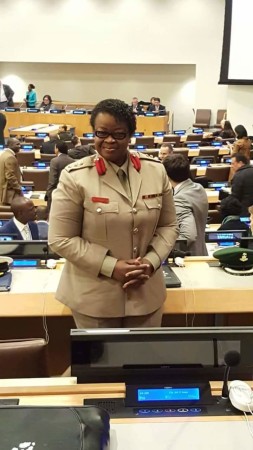Right in time for International Women’s Day this year we are thrilled to hear about Ghanaian Col. Constance Edjeani-Afenu’s promotion to the rank of Brig. General. It is the first time in the history of the Ghana Armed Forces that a woman has attained this rank.
Edjeani-Afenu, the Deputy Military Adviser of the Permanent Mission of Ghana to the United Nations in New York, now joins Africa’s tiny handful of elite ranking female officers.
This is a huge step forward for women in Ghana and shows how far we have come in such a male-dominated sector. We celebrate her achievement.
At AWDF we support changemakers – women’s activist organizations and individuals who defend and advance women’s empowerment, voice and rights. The Nimbus Foundation is an example of one such group. An $8,000 dlr grant from AWDF in 2015 enabled the Foundation to train 100 police officers to effectively handle cases of reported abuse. The police, selected from the Greater Accra region, were provided with a better understanding rights of the vulnerable, how to reduce rights violation by security officers. The officers; training was completed last month.
In 2001 Squadron Leader (Sqn Ldr) Selase Agbenyefia graduated as Ghana’s first female military helicopter pilot. She is also the first female helicopter pilot who flew with the Ghana Aviation Unit of the United Nations Peacekeeping Mission in Cote d’Ivoire UNOCI. More recently in August 2015, Col Felicia Twum-Barima was appointed Director of the Education Corps for the Ghana Armed Forces, another first.
Turning to a completely different subject, AWDF will investigate Violence Against Women, Sexuality and Relationships on university campuses in Ghana, with a special emphasis on Date Rape and Sexual Assault. Read here our in-depth interviews with students on the University of Ghana as they open up about real-life relationships on campus.
For International Women’s Day we also salute women whose innovative and heroic interventions proved timely and life-saving during West Africa’s Ebola epidemic which raged from March 2014 to September 2015. Read how Sierra Leone’s Media Matters For Women made that crucial difference here.

